Ditapis dengan

Economic costs of firm-level information infrastructure failures Estimates fr…
Abstract Purpose – This paper presents a method for estimating the macro-economic cost of a firm-level information system disruption within a supply chain. Design/methodology/approach – The authors combine field study estimates with a Leontief-based input-output model to estimate the macro-economic costs of a targeted internet outage that disrupts the supply chain.
- Edisi
- The International Journal of Logistics Management
- ISBN/ISSN
- -
- Deskripsi Fisik
- 25 halaman
- Judul Seri
- Economic costs of firm-level information infrastructure failures Estimates from field studies in manufacturing supply chains
- No. Panggil
- ATC PO SCO a

Customer intentions to invoke service guarantees Do excellence in service rec…
Abstract Purpose – Many service providers feel confident about their service quality and thus offer service guarantees to their customers. Yet service failures are inevitable. As guarantees can only be invoked when customers report service failures, firms are given the opportunity to redress the original failure potentially influencing customer outcomes. The purpose of this paper is to prov…
- Edisi
- Managing Service Quality: An International Journal
- ISBN/ISSN
- -
- Deskripsi Fisik
- 20 halaman
- Judul Seri
- Customer intentions to invoke service guarantees Do excellence in service recovery, type of guarantee and cultural orientation matter?
- No. Panggil
- ATC PO YVE a

European Monetary Union: the need for a contingency strategy within the retai…
Abstract The decision on which countries will participate in European Monetary Union (EMU) is to take place as early as possible in 1998, with the final run-in, regarding the technicalities of introducing a single currency, starting on 1 January 1999. With this timetable in mind, examines some of the major issues which will have to be confronted by UK retailers. Even if the UK Government decid…
- Edisi
- International Journal of Retail & Distribution Man
- ISBN/ISSN
- -
- Deskripsi Fisik
- 15 halaman
- Judul Seri
- European Monetary Union: the need for a contingency strategy within the retail sector
- No. Panggil
- ATC PO NIC a

China’s exports in a world of increasing oil prices
Abstract Purpose – This paper aims to examine the impact of oil prices on trade’s sensitivity to distance. Furthermore, it seeks to investigate if the nature of trade and the type of goods have a mediating role on the oil prices’ impact on trade. Design/methodology/approach – A set of gravity models are estimated on a unique panel dataset from China Customs Statistics that reports tra…
- Edisi
- Multinational Business Review
- ISBN/ISSN
- -
- Deskripsi Fisik
- 20 halaman
- Judul Seri
- China’s exports in a world of increasing oil prices
- No. Panggil
- ATC PO BYR a

Does efficiency matter? Examining the efficiency-profitability link in the US…
Abstract Purpose – The purpose of this paper is to examine the link between efficiency and profitability in the US specialty retailers and food consumer stores using cross-sectional data for the year 2007. Design/methodology/approach – This study uses a non-parametric data envelopment analysis (DEA) approach to measure the relative efficiency of 45 retailers in the USA. The study also qu…
- Edisi
- International Journal of Productivity and Performa
- ISBN/ISSN
- -
- Deskripsi Fisik
- 21 halaman
- Judul Seri
- Does efficiency matter? Examining the efficiency-profitability link in the US specialty retailers and food consumer stores
- No. Panggil
- ATC PO MOH a

Chinese and Indian firms in Europe: characteristics, impacts and policy impli…
Abstract Purpose – Among emerging countries’ foreign direct investment (FDI) in Europe, the Chinese and the Indian ones are the more relevant. Therefore, the paper focuses on Chinese and Indian affiliates in Europe, with a twofold purpose: to shed light on their characteristics and behaviour and to analyse some policy issues in the EU stemming from their arrival to Europe. Design/methodol…
- Edisi
- International Journal of Emerging Markets
- ISBN/ISSN
- -
- Deskripsi Fisik
- 23 halaman
- Judul Seri
- Chinese and Indian firms in Europe: characteristics, impacts and policy implications
- No. Panggil
- ATC PO YUN a

Determinants and consequences of consumer satisfaction with self-service tech…
Abstract Purpose – The purpose of this study is to investigate the antecedents and consequences of consumer satisfaction with the use of self-service technology (SST) in a retail setting. Design/methodology/approach – In cooperation with a survey firm, a total of 424 respondents were collected from among consumers who had experience of using multimedia kiosks at convenience stores in Tai…
- Edisi
- Managing Service Quality: An International Journal
- ISBN/ISSN
- -
- Deskripsi Fisik
- 20 halaman
- Judul Seri
- Determinants and consequences of consumer satisfaction with self-service technology in a retail setting
- No. Panggil
- ATC PO MIC a

Economics of a Nordic paper mill: case study
Abstract Purpose – The purpose of this paper is to reveal how the prices, costs, and logistics develop in the case mill and how these variables correlate with profits, and finally to give suggestions for improvements. Design/methodology/approach – A typical Finnish paper mill is selected for the basis of the case study. The complete data for the mill for the years 2001 to 2007 at a monthly…
- Edisi
- Industrial Management & Data Systems
- ISBN/ISSN
- -
- Deskripsi Fisik
- 20 halaman
- Judul Seri
- Economics of a Nordic paper mill: case study
- No. Panggil
- ATC PO ESA a

Environmental assessment of shipment release policies
Abstract Purpose – A program of shipment consolidation (SCL) is the purposeful intervention by management to regularly combine several small shipments so that a larger load may be dispatched on the same vehicle. SCL decisions traditionally have been based upon minimization of total logistics costs (inventory plus transportation). The paper aims to answer the following research question: give…
- Edisi
- International Journal of Physical Distribution & L
- ISBN/ISSN
- -
- Deskripsi Fisik
- 17 halaman
- Judul Seri
- Environmental assessment of shipment release policies
- No. Panggil
- ATC PO RYA a

Case pack quantity’s effect on retail market share An examination of the ba…
Abstract Purpose – The purpose of this study is to investigate the impact of a key logistics and distribution variable, case pack quantity, on a consumer packaged goods (CPG) manufacturing firm’s performance. The paper builds theory with respect to case pack quantity’s dichotomous impact on the retail shelf replenishment process and subsequent impact on market share depending on product …
- Edisi
- International Journal of Physical Distribution & L
- ISBN/ISSN
- -
- Deskripsi Fisik
- 19 halaman
- Judul Seri
- Case pack quantity’s effect on retail market share An examination of the backroom logistics effect and the store-level fill rate effect
- No. Panggil
- ATC PO MAT a

Characteristics of the information content in business sentiment surveys
Abstract Purpose – The purpose of this manuscript is to quantify exactly how much information and/or predictive content is contained in business sentiment surveys. Design/methodology/approach – This paper uses techniques drawn from information theory econometrics, and more specifically the theory of information entropy, to characterize the predictive content of business sentiment surveys. …
- Edisi
- American Journal of Business
- ISBN/ISSN
- -
- Deskripsi Fisik
- 20 halaman
- Judul Seri
- Characteristics of the information content in business sentiment surveys
- No. Panggil
- ATC PO DAN a

Comparative efficiencies of specialty coffee retailers from the perspectives …
Abstract Purpose – The purpose of this paper is to illuminate light on the assessment of operating efficiency of specialty coffee retailers from the perspective of socially responsible global sourcing. This paper evaluates the impact of socially responsible sourcing on the operating efficiencies of specialty coffee retailers before and after implementing fair-trade practices and compares th…
- Edisi
- The International Journal of Logistics Management
- ISBN/ISSN
- -
- Deskripsi Fisik
- 22 halaman
- Judul Seri
- Comparative efficiencies of specialty coffee retailers from the perspectives of socially responsible global sourcing
- No. Panggil
- ATC PO SEO a

Cameroon reached the heavily indebted poor countries (HIPC) initiative: expec…
Abstract Purpose – This paper aims to focus on the expectations and predicaments of Cameroonian civil servants two years after the country reached its completion point of the Heavily Indebted Poor Countries (HIPC) initiative.
- Edisi
- Social Responsibility Journal
- ISBN/ISSN
- -
- Deskripsi Fisik
- 17 halaman
- Judul Seri
- Cameroon reached the heavily indebted poor countries (HIPC) initiative: expectations of civil servants and their predicaments
- No. Panggil
- ATC PO PIU a

An analysis of the South Korean automotive, shipbuilding and steel industries
Introduction In addition to the outstanding success of the Japanese industry, a number of other Asian countries are emerging as the new power-houses of manufacturing. Over the past ten years the South Korean industry has developed as a major exporter of manufactured goods and has become the second most productive manufacturing nation in Asia after Japan. In a number of markets the South Korea…
- Edisi
- Benchmarking for Quality Management & Technology
- ISBN/ISSN
- -
- Deskripsi Fisik
- 18 halaman
- Judul Seri
- An analysis of the South Korean automotive, shipbuilding and steel industries
- No. Panggil
- ATC PO AMR a

Adapting smart specialisation to a micro-economy – the case of MaltaAdaptin…
Abstract Purpose – The purpose of this paper is to set out the process by which a smart specialisation strategy was developed for a small, peripheral economy in the European Union, the Republic of Malta. It assesses the applicability of the approach in the context of a micro-economy with an industrial structure based on a small number of foreign direct investments and a predominance of mic…
- Edisi
- European Journal of Innovation Management
- ISBN/ISSN
- -
- Deskripsi Fisik
- 21 halaman
- Judul Seri
- Adapting smart specialisation to a micro-economy – the case of Malta
- No. Panggil
- ATC PO LUK a

A survey of data envelopment analysis in energy and environmental study
Abstract Data envelopment analysis has gained great popularity in energy and environmental (E&E) modeling in recent years. In this paper, we present a literature survey on the application of data envelopment analysis (DEA) to E&E studies. We begin with an introduction to the most widely used DEA techniques, which is followed by a classification of 100 publications in this field. The main featu…
- Edisi
- ResearchGate
- ISBN/ISSN
- -
- Deskripsi Fisik
- 19 halaman
- Judul Seri
- A survey of data envelopment analysis in energy and environmental study
- No. Panggil
- ATC PO ZHO a

A rolling stone gathers no moss: prevent your strategic plan from stagnating
Just as a rolling stone gathers no moss, a strategic plan that’s actually used will gather no dust. Too often, companies devote time and energy to developing strategic plans, only to never look at them again once they have been printed out. This article explains the critical importance of actually using and implementing your company’s strategic plan, and offers practical tips for avoiding…
- Edisi
- Business Strategy Series
- ISBN/ISSN
- -
- Deskripsi Fisik
- 9 halaman
- Judul Seri
- A rolling stone gathers no moss: prevent your strategic plan from stagnating
- No. Panggil
- ATC PO JOH a

A non-structural test for competition in the container liner shipping industry
The liner shipping industry has experienced fundamental changes in recent years due to globalization, deregulation, horizontal/vertical integration, (increased) cooperation, rationalization, developments in information technology, consolidation and increased concentration. These developments may affect competition. As in other industries, competition in the (containerized) liner shipping indust…
- Edisi
- Maritime Logistics
- ISBN/ISSN
- -
- Deskripsi Fisik
- 17 halaman
- Judul Seri
- A non-structural test for competition in the container liner shipping industry
- No. Panggil
- ATC PO CHR a

An Evaluation of Container Development Strategies in the Port of Taichung
Abstract The objective of this study is to examine the container development strategies in the port of Taichung from the viewpoints of carriers, port authorities and shipping academics. The six most important strategic attributes from the all respondents perceptions are Enhancing the services of direct shipping with Mainland China, simplified customs procedures, simplified administrative proce…
- Edisi
- The Asian Journal of Shipping and Logistics
- ISBN/ISSN
- -
- Deskripsi Fisik
- 26 halaman
- Judul Seri
- An Evaluation of Container Development Strategies in the Port of Taichung
- No. Panggil
- ATC PO CHI a

Understanding organizational change for alliancing
Abstract Purpose – The purpose of this paper is to examine an organization’s operational alignment in the process of alliance formation. Design/methodology/approach – A literature study was conducted on the strategic importance of assessing and aligning organizations’ operations for alliancing. Furthermore, an instrumental case study was conducted to provide insight in the degree of op…
- Edisi
- Journal of Organizational Change Management
- ISBN/ISSN
- -
- Deskripsi Fisik
- 18 halaman
- Judul Seri
- Understanding organizational change for alliancing
- No. Panggil
- ATC PO BIA a

Towards a Better Understanding of Experience during Trips: Impact on Satisfac…
AbstractPurpose – The purpose of this paper is to reinforce the experiential paradigm from which academics and practitioners currently explain consumer decision making in touristic activities. More specifically, this research brings new insights for understanding consumption experience. The aim is to establish relationships between Experience, Satisfaction, Destination Attachment, as well as …
- Edisi
- International Journal of Tourism Cities
- ISBN/ISSN
- -
- Deskripsi Fisik
- 40 halaman
- Judul Seri
- Towards a Better Understanding of Experience during Trips: Impact on Satisfaction, Destination Attachment and Word-of-Mouth
- No. Panggil
- ATC PO HAG a

Time to rethink Norwegian maritime collaboration exercises
Purpose This case study maps the perceived collaboration between public, private, and volunteer organizations during maritime crisis work, with a substantive focus on communication, information flow, and distribution of activities. The exercise studied was held in the far north in Norway. It was estimated to be Europe’s most extensive exercise in 2016. Design The data were collected through …
- Edisi
- International Journal of Emergency Services
- ISBN/ISSN
- -
- Deskripsi Fisik
- 30 halaman
- Judul Seri
- Time to rethink Norwegian maritime collaboration exercises
- No. Panggil
- ATC PO ELS a

Service quality in maritime transport: conceptual model and empirical evidence
Abstract Purpose – The purpose of this paper is to extend knowledge on service quality and how it is defined and thus, managed, in the context of maritime transport by proposing and testing a new conceptual model of service quality. Design/methodology/approach – The study used a sample of 197 shipping companies, port operators and freight forwarders/logistics service providers, employing t…
- Edisi
- Service quality in maritime transport
- ISBN/ISSN
- -
- Deskripsi Fisik
- 26 halaman
- Judul Seri
- Service quality in maritime transport: conceptual model and empirical evidence
- No. Panggil
- ATC PO VIN a

Senses of “shipscapes”: an artful navigation of ship architecture and aes…
Abstract Purpose – In the context of organizational aesthetics, “built environments” remain under-explored. The purpose of this paper is to enter the maritime world of ship architectures to navigate sensory-aesthetic knowledge of a sailor’s place-based memories. Design/methodology/approach – Challenges have been issued to explore the potential for artistic-sensual methodologies to b…
- Edisi
- Journal of Organizational Change Management
- ISBN/ISSN
- -
- Deskripsi Fisik
- 19 halaman
- Judul Seri
- Senses of “shipscapes”: an artful navigation of ship architecture and aesthetics
- No. Panggil
- ATC PO JOH a

Revisiting the resource-based view on logistics performance in the shipping i…
Abstract Purpose –The purpose of this study is to evaluate empirically the impact of intrafirm resources, interfirm relationships, and logistics service capabilities on logistics performance in the container logistics context. Design/methodology/approach –Factor analysis was employed to identify the key intrafirm resources (i.e. tangible assets and intangible assets), interfirm relation…
- Edisi
- International Journal of Physical Distribution & L
- ISBN/ISSN
- -
- Deskripsi Fisik
- 29 halaman
- Judul Seri
- Revisiting the resource-based view on logistics performance in the shipping industry
- No. Panggil
- ATC PO CHU a

Maritime Safety Culture in Europe
Therefore, it was time for the European Union to act and to develop a new concept of safety culture. A parallel can be drawn between the attitude of the International Maritime Organisation (IMO) and the attitude of the European Union. The IMO is well known for promoting and improving safety and also in being reactive to maritime disasters. Now we discover a new philosophy of “anticipating a…
- Edisi
- Managerial Law
- ISBN/ISSN
- -
- Deskripsi Fisik
- 61 halaman
- Judul Seri
- Maritime Safety Culture in Europe
- No. Panggil
- ATC PO LUC a

Maritime piracy and the cost of world trade*
Abstract Purpose – The aim of this study is to determine the nature and extent of the threat of global maritime piracy. The cost of global piracy has been estimated at USD15-25 billion, reaching an all-time high in 2011, remaining an ongoing threat to world trade and contributing to high commodity costs.
- Edisi
- Maritime piracy
- ISBN/ISSN
- -
- Deskripsi Fisik
- 14 Halaman
- Judul Seri
- Maritime piracy and the cost of world trade*
- No. Panggil
- ATC PO STE a

Knowledge management capability and supply chain management practices in the …
Abstract Purpose – The main goal of this research is to examine the effect of knowledge management capabilities on supply chain management practices and organizational performance in firms, in addition to examining the effect of supply chain management on organizational performance. Design/methodology/approach – To demonstrate the effect of knowledge management capabilities on supply chain…
- Edisi
- Business Process Management Journal
- ISBN/ISSN
- -
- Deskripsi Fisik
- 24 halaman
- Judul Seri
- Knowledge management capability and supply chain management practices in the Saudi food industry
- No. Panggil
- ATC PO AHM a

Impact of Maritime Labour Convention on design of new ships
Abstract Purpose – The Maritime Labour Convention (MLC) embodies standards of existing international maritime labour conventions and recommendations, as well as the fundamental principles to be found in other international labour conventions. The aim of the convention is to address the employment standards of seafarers in the areas of fair wages, contractual terms, working and living condit…
- Edisi
- Maritime Business Review
- ISBN/ISSN
- -
- Deskripsi Fisik
- 14 halaman
- Judul Seri
- Impact of Maritime Labour Convention on design of new ships
- No. Panggil
- ATC PO HWA a

Evaluating the use of alternative maritime power in Taiwan
Abstract Purpose – The purpose of this study is to empirically evaluate the impacts of institutional pressures on the use of alternative maritime power (AMP) and which in turn enhance environmental performance in the maritime shipping context. Design/methodology/approach – Factor analysis was used to identify the key coercive pressure, normative pressure, mimetic pressure, AMP practice and…
- Edisi
- Maritime Business Review
- ISBN/ISSN
- -
- Deskripsi Fisik
- 18 Halaman
- Judul Seri
- Evaluating the use of alternative maritime power in Taiwan
- No. Panggil
- ATC PO CHU a

Evaluating the supply chain information flow in Egyptian SMEs using six sigma…
Abstract Purpose – There is a great deal of concern among the Egyptian economy that small- and medium-sized enterprises’ (SMEs’) potentials are not fully used although they dominate it and contribute to its success. The question is what challenges are preventing those SMEs from performing efficiently. This research aims to focus on examining the issues regarding the supply chain of Egypt…
- Edisi
- International Journal of Lean Six Sigma
- ISBN/ISSN
- -
- Deskripsi Fisik
- 30 halaman
- Judul Seri
- International Journal of Lean Six Sigma
- No. Panggil
- ATC PO OMN a

Australian Association for Maritime History
The major problems with this work centre upon the author's failure to provide it with a coherent conceptual framework, and a concomitant lack of integration between the component parts of the book. The author states his objectives, but the questions posed remain largely unanswered in what is essentially a series of essays about sone aspects of planning in some port cities of early modern Europe…
- Edisi
- Maritime History
- ISBN/ISSN
- -
- Deskripsi Fisik
- 3 halaman
- Judul Seri
- Australian Association for Maritime History
- No. Panggil
- ATC PO KEN a
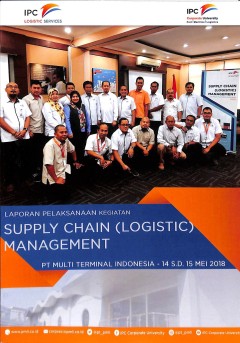
laporan pelaksanaan kegiatan supply chain (LOGISTIC) management
- Edisi
- -
- ISBN/ISSN
- -
- Deskripsi Fisik
- 17 halaman
- Judul Seri
- -
- No. Panggil
- IPC REP 2018 CHA c C.1
- Edisi
- -
- ISBN/ISSN
- -
- Deskripsi Fisik
- 17 halaman
- Judul Seri
- -
- No. Panggil
- IPC REP 2018 CHA c C.1
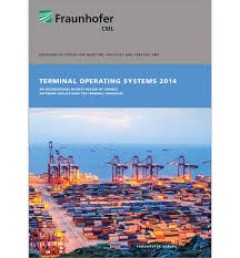
Terminal operating systems 2014 : an international market review of current s…
The worldwide market of terminal operating systems is very heterogeneous. It is characterized by many providers each of them offering more than one different product. The range of functions of each product is quite diverse depending on the scope of the product. This market survey is supposed to bring transparency into this market. Therefore public information as well as information derived from…
- Edisi
- -
- ISBN/ISSN
- 978-3-8396-0730-5
- Deskripsi Fisik
- 63 p., 33 cm
- Judul Seri
- -
- No. Panggil
- TXT PO JAH t
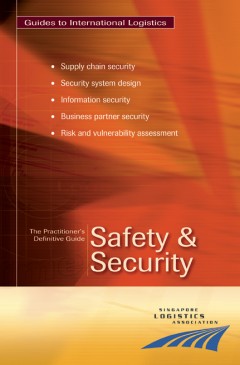
The Practitioner's Definitive Guide : Safety & Security
The terrorist attacks on September 11, 2001, stunned the world into looking at the issue of security much more seriously. No longer is supply chain security just about controlling theft - the supply chain can be made use of by terrorists and other undesirable elements. In this comprehensive guide for practitioners to the best practices in safety and security, you…
- Edisi
- 2nd edition
- ISBN/ISSN
- 978-981-4266-18-5
- Deskripsi Fisik
- 263p : 23cm
- Judul Seri
- second edition
- No. Panggil
- LO MUN t
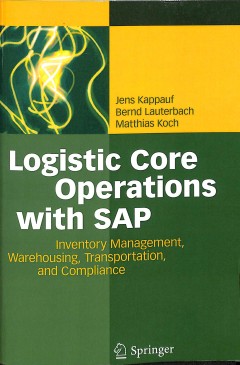
Logistic core operations with SAP : inventory management, warehousing, transp…
Logistic Core Operations with SAP” not only provides an overview of core logistics processes and functionality—it also shows how SAP’s Business Suite covers logistic core operations, what features are supported, and which systems can be used to implement end-to-end processes in the following logistic core disciplines: Procurement, Distribution, Transportation, Warehouse Logistics and Inve…
- Edisi
- -
- ISBN/ISSN
- 978-3-642-43593-5
- Deskripsi Fisik
- viii, 293 p., ; illus : 21 cm ; index
- Judul Seri
- -
- No. Panggil
- TXT LO KAP l
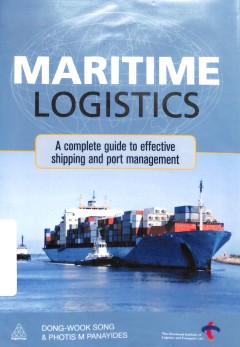
Maritime logistic : a complete guide to effective shipping and port management
Current globalization and borderless operations in manufacturing are creating a greater demand for international transportation and supply chain logistics. Maritime (shipping and ports) is one of the key components in this business pattern. It is now estimated that approximately 90% of global trading freight moves by ship. As this trade increases it is becoming more important to have a clear un…
- Edisi
- -
- ISBN/ISSN
- 978-0-7494-63694
- Deskripsi Fisik
- xiv, 326 p., 24 cm ; index
- Judul Seri
- -
- No. Panggil
- LC 388.04 SON m

The integrated logistics management system: a framework and case study
The purpose of this article is to formulate an integrated framework for distribution firms to establish and so improve their distribution systems. Since information technology is an important prerequisite to good logistics management, integration of information technology with the logistics management concept is presented. In the presentation, relevant Taiwanese practices are covered. Because f…
- Edisi
- Vol. 25 No. 6, 1995
- ISBN/ISSN
- -
- Deskripsi Fisik
- 22 p.
- Judul Seri
- International Journal of Physical Distribution & Logistics Management
- No. Panggil
- ATC LO NEN t

City Logistics Mapping The Future
This book contains information obtained from authentic and highly regarded sources. Reasonable efforts have been made to publish reliable data and information, but the author and publisher cannot assume responsibility for the validity of all materials or the consequences of their use. The authors and publishers have attempted to trace the copyright holders of all material reproduced in this pub…
- Edisi
- 20140923
- ISBN/ISSN
- 13: 978-1-4822-0892-
- Deskripsi Fisik
- 228P
- Judul Seri
- City Logistics
- No. Panggil
- ATC LO TAN c
Indonesia Integrated port network
- Edisi
- -
- ISBN/ISSN
- -
- Deskripsi Fisik
- 32 page
- Judul Seri
- -
- No. Panggil
- PPT PO ELV i
- Edisi
- -
- ISBN/ISSN
- -
- Deskripsi Fisik
- 32 page
- Judul Seri
- -
- No. Panggil
- PPT PO ELV i

Household waste collection as a reverse channel: A theoretical perspective
Of great concern today is how to collect and recycle post‐consumer waste efficiently. Reports the results of a study of 47 collection schemes for household waste which examined their logistical characteristics. An extensive literature review revealed that much recycling research suffers from a lack of theory. Discusses why and how logistics theory can contribute to the understanding of what i…
- Edisi
- Vol. 25 No. 2, 1995, pp. 39-55.
- ISBN/ISSN
- -
- Deskripsi Fisik
- 20 p.
- Judul Seri
- International Journal of Physical Distribution & Logistics
- No. Panggil
- ATC LO JAH h

Prioritisation of performance indicators in air cargo demand management
Purpose – Real operational data are used to optimise the performance measurement of air cargo capacity demand management at Virgin Atlanticb Cargo by identifying the best KPIs from the range of outcome-based KPIs in current use. Design/methodology/approach – Intelligent fuzzy multi-criteria methods are used to generate a ranking order of key outcome-based performance indicators. More spec…
- Edisi
- -
- ISBN/ISSN
- 1359-8546
- Deskripsi Fisik
- -
- Judul Seri
- -
- No. Panggil
- ATC LO MAY p

Building humanitarian supply chain relationships: lessons from leading practi…
The purpose of this paper is to advance thought and practice on supply chain relationship building, in the context of humanitarian logistics, drawing on lessons from leading practitioners.
- Edisi
- Vol. 1 No. 1, 2011 pp. 32-49
- ISBN/ISSN
- -
- Deskripsi Fisik
- 21 p .
- Judul Seri
- Journal of Humanitarian Logistics and Supply Chain Management
- No. Panggil
- ATC LO LAC b

A comparative analysis of free trade zone policies in Taiwan and Korea based …
The goal of this paper is to discuss the functions of a port hinterland, perform comparative analysis of existing port-type FTZ regulations and systems in Taiwan and Korea based on a port hinterland perspective, and provide recommendations concerning relevant policies and measures to government. This paper’s findings can be summarized as follows: (1) Existing container terminals in Taiwan co…
- Edisi
- Volume 25 Number 2 December 2009
- ISBN/ISSN
- -
- Deskripsi Fisik
- 31 p.
- Judul Seri
- -
- No. Panggil
- ATC PO CHIN a
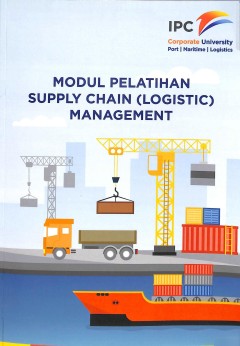
Modul Pelatihan : Supply Chain (Logistic) Management
This module is an introductory to Supply Chain Management, anad part of module of FIATA Higher Diploma in Supply Chain Management
- Edisi
- -
- ISBN/ISSN
- -
- Deskripsi Fisik
- 92 p., 29.5 cm.
- Judul Seri
- -
- No. Panggil
- IPC GUI SUP s

Green Maritime Logistics and Sustainability
The environmental consequences of international trade and transport have gained importance as a result of the current climate debate. Products are increasingly being produced in one part of the world, transported to another country and then redistributed to their final country of consumption. Since more than 80% of world trade tonnage measured in metric tons is carried by seagoing vessels, mar…
- Edisi
- 2012
- ISBN/ISSN
- 978-1-78052-340-8
- Deskripsi Fisik
- 20
- Judul Seri
- Maritime Logistics
- No. Panggil
- TXT LO LIN s

Theoritical aspects of logistics training
Authors discuss about main training needs and problems in the logistics as main driving motive for learning and training process organization in the universities and at the non-formal training places – work places, courses and training organizations. All driving motives can be named as internal and external forces which influence persons. In many cases external driving motives are related to …
- Edisi
- 2007, Vol XXII, No 1, 14–18
- ISBN/ISSN
- 1648-3480
- Deskripsi Fisik
- 6 p .
- Judul Seri
- Transport
- No. Panggil
- ATC LO PAL t

Third Party Logistics Choice
Logistics managers were surveyed regarding decisions (1) to use third party logistics services and (2) practices regarding the selection of third party providers. Responses suggest that decisions to use third party logistics services are not driven by strong preconceptions, pro or con, regarding the attractiveness of the third party option. Further, attitudes toward the use of third party logis…
- Edisi
- Vol. 6 Iss 2 pp. 93 - 102
- ISBN/ISSN
- -
- Deskripsi Fisik
- 13 p.
- Judul Seri
- The International Journal of Logistics Management
- No. Panggil
- ATC LO MCG t

Third party logistics services- a Singapore perspective
Focusses on three constructs that we believe are the primary determinants of the future usage of third party logistics services. These constructs are: extent of use of the third party logistics services; decision making process for choosing contract logistics services provider; and impact of the usage of contract logistics services on the organisation. An empirical research was carried out in…
- Edisi
- Vol. 29 No. 9, 1999, pp. 569-587
- ISBN/ISSN
- 0960-0035
- Deskripsi Fisik
- 25 p.
- Judul Seri
- Third party logistics services
- No. Panggil
- ATC LO BHA t

Third party logistics services usage by large Australian firms
Outsourcing of logistics functions is a business dynamic of growing importance in Australia (for example, see [1]) and elsewhere in the world (see, for example [2,3]. Third party logistics involves the use of external companies to perform logistics functions which have traditionally been performed within an organization. The functions performed by the third party can encompass the entire logist…
- Edisi
- Vol. 26 No. 10, 1996, pp. 36-45.
- ISBN/ISSN
- 0960-0035
- Deskripsi Fisik
- 13 p.
- Judul Seri
- International Journal of Physical Distribution & Logistics Management
- No. Panggil
- ATC LO DAP t
 Karya Umum
Karya Umum  Filsafat
Filsafat  Agama
Agama  Ilmu-ilmu Sosial
Ilmu-ilmu Sosial  Bahasa
Bahasa  Ilmu-ilmu Murni
Ilmu-ilmu Murni  Ilmu-ilmu Terapan
Ilmu-ilmu Terapan  Kesenian, Hiburan, dan Olahraga
Kesenian, Hiburan, dan Olahraga  Kesusastraan
Kesusastraan  Geografi dan Sejarah
Geografi dan Sejarah